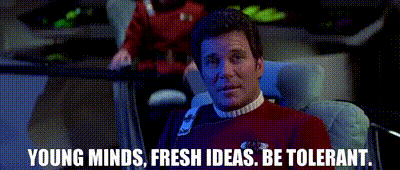Spock in TOS said the Eugenics War was the last world war in the 90s. But then TNG added a WW3 in the 21st century.
Not added so much as moved. In 1987, it was no longer viable to predict that a group of eugenic superhumans would take over most of the world in 1992, so Roddenberry retconned the Third World War to a safer distance. Note that TNG never acknowledged the Eugenics Wars in any way; they weren't referenced again until "Doctor Bashir, I Presume" in DS9's fifth season.
Then again, not every work of fiction uses the same logic. The aforementioned
Alien Nation movie was released in 1988 and set in 1991, and it set the date of the aliens' arrival on Earth three years earlier as just 12 days after the movie was released in theaters. (Although it was originally meant as a summer movie but got postponed due to reshoots. The movie that took its summer slot was a little film called
Die Hard.) The TV series premiered in September '89 and put the date of the aliens' arrival around November or December '90, with the show set in '95. The revival movies started coming out in '95 and retconned the series present to '99, with the arrival reset at '92, already in the movies' past.
It's not a hard and fast rule, since some things are going to be more heavy on claims of continuity than others (to go back to Xena, you'd often see historical figures or events that end up in close proximity when they were nowhere near one another in reality), but it's effectively my baseline.
In the combined
Hercules/Xena universe, everyone from Helen of Troy to Julius Caesar to Vlad the Impaler lived at the same time, a span of nearly 3000 years. And that's not even getting into the episode where a modern TV news crew followed Xena and Gabrielle around with cameras and these "Ancient Greek" characters took it in stride. I don't think Herc/Xena is the best analogy to use, since it was gleefully unconcerned with realism, basically embracing the same fast-and-loose approach to reality as the original myths it was based on. I see what you're saying, but that franchise is toward the extreme end of the spectrum.
I've been making a habit of going back and reading some of the excellent novels from the 1990s and early 2000s. And while the shows were on, the books were bottle episodes and wildly out of sync with later show canon or the later litverse. Who cares? They're fun stories. Headcanon: This is an adventure that happened in a quantom filiment universe blah blah. Whatever.
I've never needed to believe that a story was an "alternate timeline" in order to enjoy it as a story. It's just a different creative interpretation of a work of fiction, that's all. You choose to pretend it's real while you're reading or watching it, then when you're done, you just let it be a story. So it doesn't need to be connected to anything else to feel real.
Granted, since I like (but don't
need) continuity, I have been open to the idea of Trek novels/comics being alternate timelines. But I find that in most cases, that doesn't actually work to explain the inconsistencies, because tie-ins' contradictions with canon are often in areas that couldn't be accounted for by alternate timelines, like entire species or planets being physically different, or the laws of physics working differently, or the chronological assumptions being different so that TOS happens 60 years earlier, or just the overall feel of the universe and characters as depicted in the story being too different. The percentage of books whose inconsistencies can be validly rationalized as timeline differences is quite low. It just doesn't work as a catchall excuse, not if you approach it remotely plausibly.
To go back on topic a bit... In the novels that follow a strong continuity, I do find the "catch up" parts of novels tiresome. I understand why they're there and probably editor mandated, and I've taken to speed reading over them and hoping a salient bit of plot detail for the novel I'm reading isn't buried in the middle. For franchise novels it can often be something that pads the books but kills the pace.
As I often say, there are better and worse ways to handle recap exposition. I always try to keep recaps concise, with no more detail than necessary for the current story, and sometimes with bits and pieces of the background information spread out over more than one scene rather than in a single big infodump. And I try to come at them from a fresh angle -- say, I relate the events of an episode from a different perspective, offering a different interpretation of it or adding new parts of the story and its context that the viewers didn't see before. Or I focus less on the facts of what happened than on the emotions of the person reflecting on it, what they think and feel and wonder about it after the fact. That way, even people familiar with the previous story can get something new and hopefully interesting from the recap.
And no, they aren't editorially mandated. No editor has ever told me I was required to recap an episode, let alone that I had to do it in a certain way. If, say, I neglected to provide sufficient backstory for a plot point to be clear to the reader, the editor would alert me to the issue, but it would be up to me to decide how to fix it.




